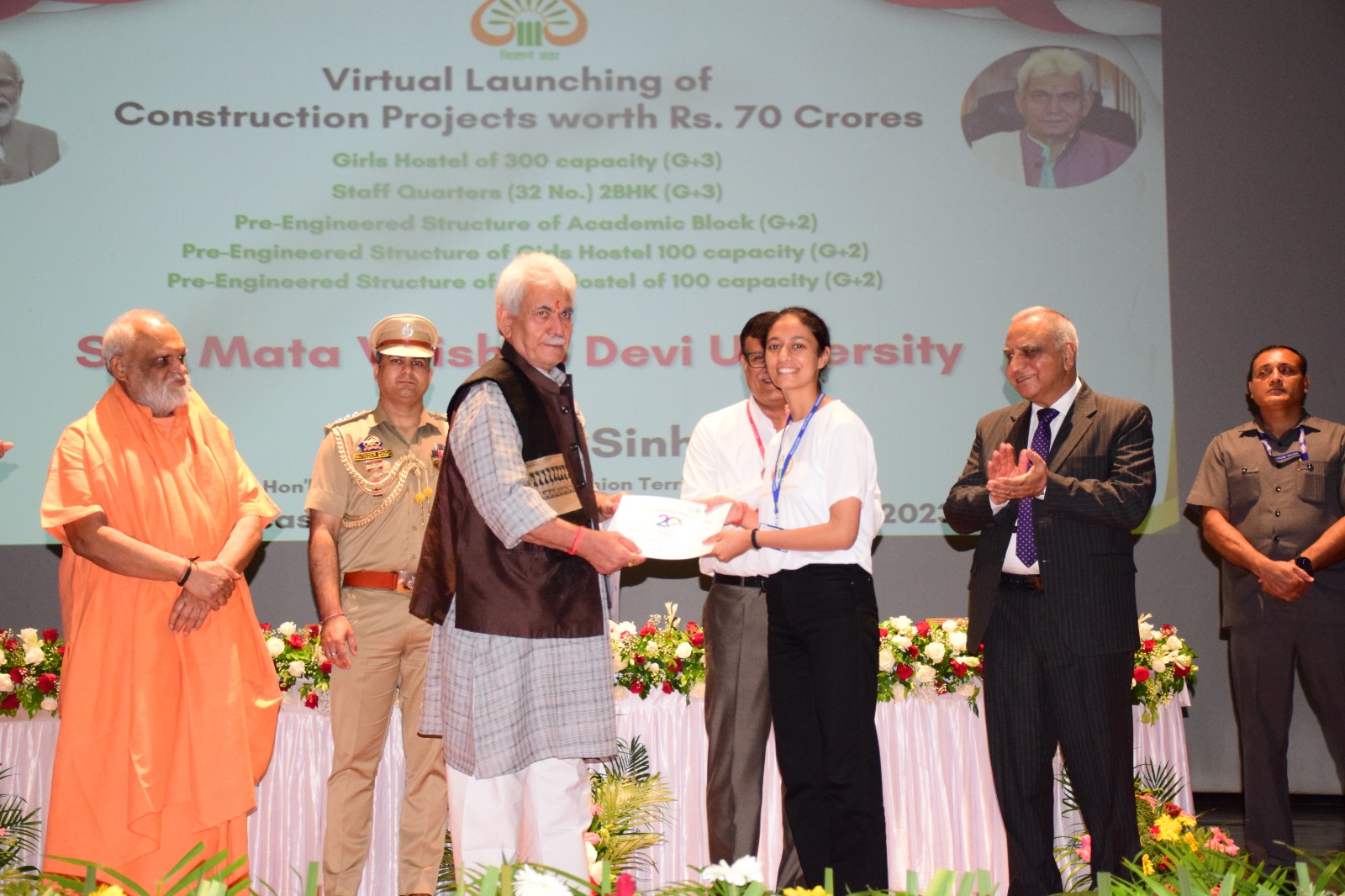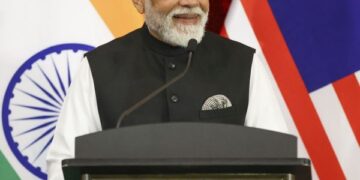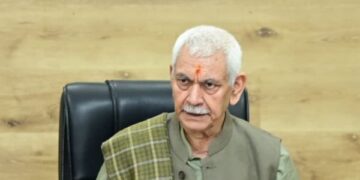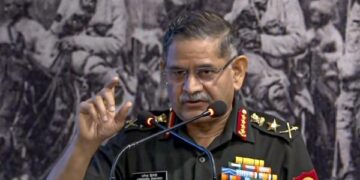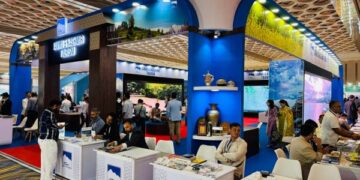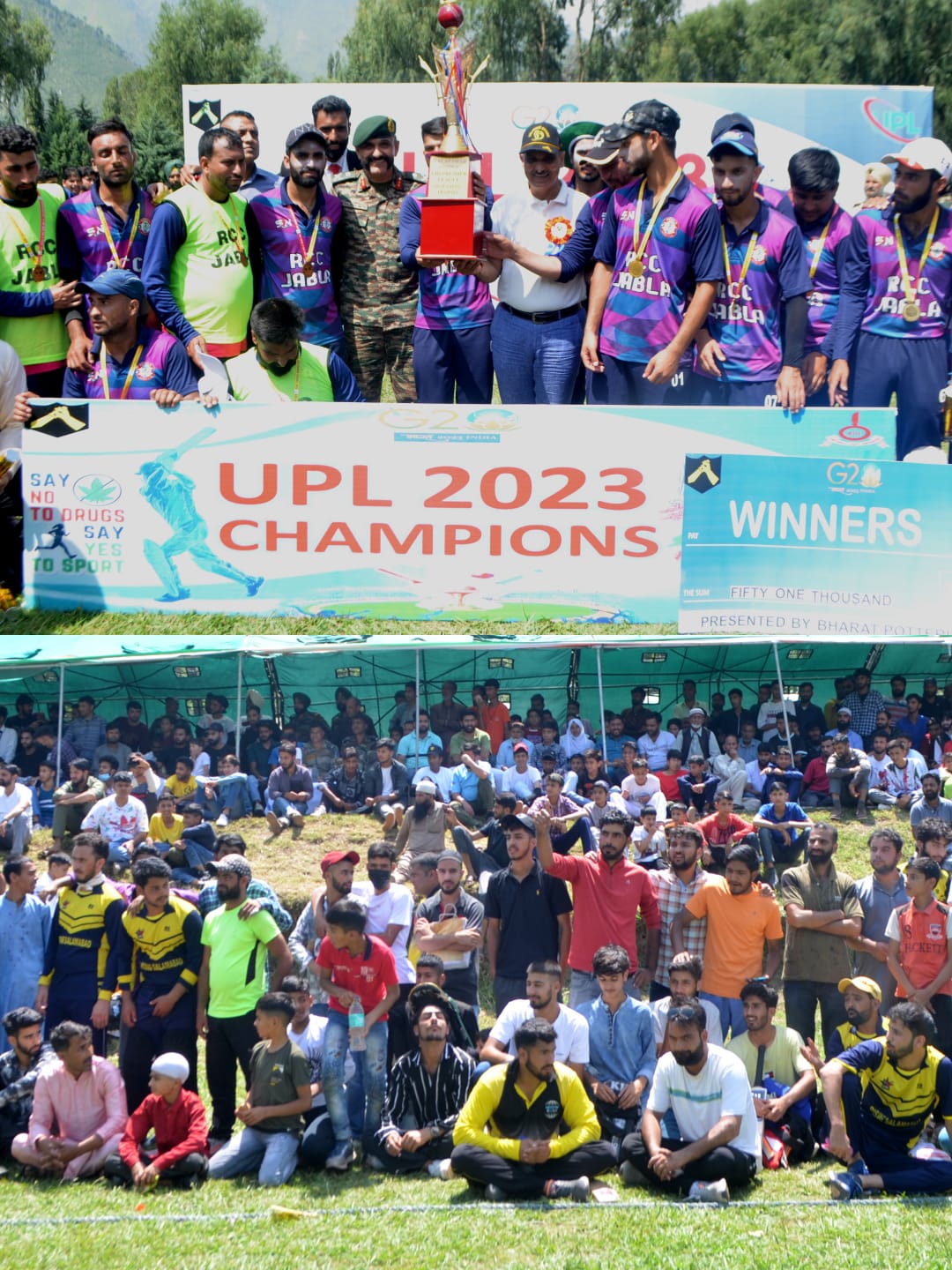Jammu: Lt Governor Manoj Sinha on Saturday advised universities to recalibrate, reform, and readjust themselves to adapt to new technologies and help students succeed in the uncharted future.
Addressing the 20th foundation day celebration of Shri Mata Vaishno Devi University (SMVDU) in Katra, he said, “It is high time we realize that the traditional learning process and education that we have known for many decades will no longer exist in the future.”
The LG also laid foundation stones for infrastructural projects worth Rs 70 crore on the occasion, an official press release informed.
On the emergence of new technologies and its impact on society, Sinha said the cutting-edge tools of artificial intelligence and the explosion of new technologies have brought social equality.
“It is changing the way we collect, process and utilize knowledge for a better world. This change also presents vast opportunities to every individual to grow and prosper,” he said, advising the universities to recalibrate, reform and readjust themselves to adapt to the changes.
In the technology-driven world, he said, the recalibration in education will liberate students from conventional academic content, disciplines and train them with skills and ability to succeed in the uncharted future.
He congratulated the students, faculty and staff members of the Shri Mata Vaishno Devi University (SMVDU) and commended the significant contribution of the university in the education sector.
“In the last two decades, the SMVDU has nurtured students, served the knowledge economy of the country with great distinction and aspires to empower the young generation,” he said, adding “it is the responsibility of our universities and teaching community to prepare enlightened citizens through research, inquiry, creativity, innovation and contribute to realize the vision of ‘Viksit Bharat’.”
He asked the higher educational institutions and universities to aim for global excellence and competitive advantage.
“We are living in the world of surprises where the only constant in life is change. But, the biggest challenge is to prepare students for the jobs that don’t yet exist. We need to provide them with skills that will remain relevant and complement the growing pace of change,” he added.
The LG said there has been a “tectonic shift from what we were producing as an agriculture society to now as a knowledge society”.
“Journey from raw materials to knowledge products has been phenomenal. Innovation and research will now become the soul and integral pillar of the universities,” he said.
Describing the National Education Policy 2020 as progressive, the LG said, “under the guidance of the Prime Minister, the progressive education policy offers the key to unlock the vast potential of basic knowledge, applied skills, critical thinking, collaboration, leadership, creativity, innovation, lifelong learning and career skills like flexibility, adaptability as well as social and cross-cultural skill.”
He also stressed the need for stronger industry-academic relationships. “In the next five years, manufacturing will shift towards automation which means innovation and digital transformation will play a significant role.”
India has already formulated an action plan for 12 identified champion sectors that include Information technology (IT) and IT enabled services (ITeS), Tourism, Legal Services, Communication Services, Environment and the Education Sector, he said, adding “I am confident India will become a unique emerging Services market and a global manufacturing hub by 2030.”
The LG also shared the unique endeavour of the Jammu University to prepare students for future jobs through ‘Design your Degree programme’.
“Such reforms will empower the students to take ownership of their own career paths and make the changes they want in their careers rather than waiting to react to changes imposed on them,” he said.
Prof. (Dr.) Pragati Kumar, Vice Chancellor, SMVDU presented the achievements of the university and gave an overview of the key initiatives taken by the university for the holistic development of the students.
Mahamandleshwar Shri Swami Vishveshvaranand Giriji Maharaj and other board members of the Shri Mata Vaishno Devi Shrine Board; Dr Mandeep Kumar Bhandari, Principal Secretary to LG; Anshul Garg, Chief Executive Officer, SMVDSB; Babila Rakwal, Deputy Commissioner, Reasi; senior officials, faculty members of the university and students were present on the occasion.
Meanwhile, Lieutenant Governor on Saturday chaired the 71st meeting of the Shri Mata Vaishno Devi Shrine Board (SMVDSB) in Reasi district, with the board according in-principle approval for setting up a medical college.
The meeting was attended by members of the board — Mahamandleshwar Swami Vishveshvaranand Giriji Maharaj; Dr Ashok Bhan; Kulbhushan Ahuja; Dr Neelam Sareen; K K Sharma; Suresh Kumar Sharma and Raghu K. Mehta – besides the LG’s Principal Secretary Mandeep Kumar Bhandari and SMVDSB Chief Executive Officer Anshul Garg, an official spokesman said.
He said the board accorded in-principle approval for the establishment of a 50-bed medical college at Kakryal at an approximate cost of Rs 350-450 crore.
“The board concurred with the projected need for expansion of the operational base of Shri Mata Vaishno Devi Narayana Superspeciality Hospital (SMVDNSH) to cater to a larger number of patients requiring specialized treatment. After extensive deliberations, the board accorded in-principle approval to addition of 200 to 220 beds to the existing capacity of the hospital at an approximate cost of Rs 120 crore,” the spokesman said.
He said the board took note of reported position, held extensive deliberations, ratified and gave in-principle approvals to as many as 36 agenda items having varied implications for the functioning of board and augmenting of pilgrim services.
The board asked the SMVDSB CEO to strive for creating best of facilities in sync with the emerging requirements for making pilgrimage a memorable experience to the devotees, the spokesman said.
He said the board granted in-principle approval to the construction of a new yatri-cum-staff accommodation at Bhawan at an approximate cost of Rs 31.51 crore.
The meeting also reviewed the progress of various pilgrim-centric mega infrastructure projects such as skywalk, retrofitting and remodeling of Parvati Bhawan and expansion of Atka area.
Garg informed the board that the prestigious projects underway at Bhawan are being expedited and are likely to be completed prior to the “Shardiya Navratras”, the spokesman said, adding he also apprised the board about various steps initiated for averting crisscross movement of pilgrims for a hassle-free “darshan”.
The SMVDSB CEO was directed to expedite construction of Shankaracharya Temple along with the creation of track and allied facilities and emphasized the need to engage all stakeholders for satisfactory resolution of all pending issues in this regard, the spokesman said.
Garg informed the meeting about the action taken on several fronts such as employees’ welfare, the amendment in administrative, financial and other powers to be exercised by various officers, the disaster management initiatives undertaken in the recent past and as to how these have helped in improving the employees’ level of preparedness to face any disaster-like situation.
The board also approved the required grant-in-aid for the FY 2023-24 in favour of SMVD Charitable Society for strengthening the functioning of the board’s peripheral institutions like Gurukul, hospital, sports complex, and college of nursing, the spokesman said.
Addressing the meeting, the LG reiterated that the facilities for pilgrims are the topmost priority of the board and all steps must be taken for their hassle-free pilgrimage.
He directed the board CEO to ensure online bookings for passenger ropeway for easy access and comfort of devotees.
The safety of passengers must be ensured, he added.
On the sidelines of the meeting, the LG, who is the Chairman of Shri Mata Vaishno Devi Shrine Board, laid e-foundation stones for cottages and a mess block near SMVD Sports Complex Katra for the devotees and staff accommodation at Banganga to be developed at a cost of Rs 14 crore.
He also launched the revamped website of Shrine Board and released the Dogri translation of Panchtantra by Dr Neelam Sareen.


